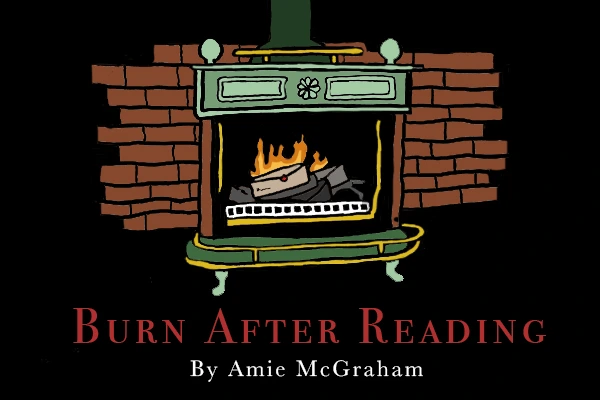BURN AFTER READING
It began with the letters. At night when my father came home from work, he’d take me aside while my mother was in the tiny ship’s galley of a kitchen preparing supper, and hand me a letter from Judy. I lived for those letters, each handwritten in penmanship as sweepingly beautiful as the Japanese alphabet. The white envelope hidden beneath my shirt as I dashed up the stairs to my room. Reading about her job in Portland as my father’s secretary; the Halloween costume she’d made for her son (Batman or Spiderman, I can’t be sure); the horses she had when she was my age. I treasured the letters, with their future promises of picnics and ferry rides. I delighted in the desire of more, almost as much as maintaining its secrecy.
“It’s our secret,” my father would whisper. “Don’t tell Mum.” And I didn’t.
*
Your father ran off with his secretary, said my mother, on a November night at the dinner table. She’d made cassoulet, her signature dish—soaked the little white beans overnight, sauteed sausage and baked it until it browned and bubbled in the orange enamel baking dish. My mother was not one to cook normal meals like my friends’ mothers, no lasagne or Shake-n-Bake for this family. Even our food was intellectual.
He drove off to work this morning, she said. He’s not coming back.
I remember the how the cassoulet smelled that night, but I do not remember eating it. I remember thinking: Judy, but saying nothing. And the letters: I said nothing about the letters.
I kept them in a Keds shoebox under my bed long after my father and Judy had hopped aboard a Greyhound bus bound for Alaska. I read and reread the letters, keeping Judy’s promises alive like a cathedral’s eternal candle flame.
When my mother found the letters months later—mothers find everything, I discovered: diaries, Marlboros, birth control pills—she was not angry, only terribly sad. By then, I already knew the hot glow of Chablis. By then, I thought I knew how to keep secrets.
We burned the letters, my mother and I, feeding the white envelopes into the woodstove one by one as if casting out the devils of a thousand transgressions.
The woodstove had taken the two of us through our first winter alone, my mother awakening twice a night to stoke the fire while I slept in my trundle bed with a brick at my feet, warmed on the stove and wrapped in newspaper. The stove, savior and absolver.
And, like my father, it is no longer a part of the household.
EMANCIPATED
I think of my mother and I think of the letters I wrote her. Twenty years’ worth, almost as many places as I’d lived. I think of the time my mother and father drove three hours to the North Woods to see me—from separate starting points, because by then, we had all started separate journeys—the three of us crammed in Verna Muldoon’s riverfront row house, where I rented a room during my senior year of high school. Verna in the background leaning against the kitchen sink, teacup in hand. Paul Harvey on the transistor radio atop an ancient Maytag. Verna: she might have been smoking a Pall Mall and if she wasn’t, the tiny kitchen reeked of it, seventy-some years of chain-smoking embedded in its walls. I wondered if my mother noticed the peeling yellowed wallpaper; if she noticed how Verna’s hand shook as she raised the teacup to her puckered lips. My mother would have noticed the lack of lipstick, though, for she never went anywhere without mauve Revlon on her lips, even if it was to the living room to practice piano songs for church, but she probably would not have noticed that the teacup was half full of blackberry brandy.
And if my mother didn’t notice the liquor at 10:00 a.m., it was because she was there for one reason: to sign the emancipation papers that would proclaim me an adult at seventeen. And in that moment, none of us could have guessed that in unshackling myself from my family, I would detach from my own soul. That three months later I’d be dangerously close to quitting high school. That I’d be living in a trailer home in that old mill town with a violent husband. That, twenty years later I would desperately want to jump from the twelfth floor of the Cleveland Hilton. That in the reparations I would make to my family decades later, I would become a mother to my parents and best friend to myself.
Amie McGraham grew up on an island in Maine where she summers as curator of family ghosts and memories. Her writing has appeared in anthologies and literary magazines including Brevity, Multiplicity, Maine Magazine, and Wild Roof Journal. She was recently chosen as winner of the 2022 Intrepid Times “Wrong Turns” travel writing competition. Amie produces a weekly 100-word newsletter, the micro mashup. Her flash blog, This Demented Life, was featured by Alzheimer Authors and is followed internationally.
Hypertext Magazine and Studio (HMS) publishes original, brave, and striking narratives of historically marginalized, emerging, and established writers online and in print. HMS empowers Chicago-area adults by teaching writing workshops that spark curiosity, empower creative expression, and promote self-advocacy. By welcoming a diversity of voices and communities, HMS celebrates the transformative power of story and inclusion.
We have earned a Platinum rating from Candid and are incredibly grateful to receive partial funding from the National Endowment for the Arts, Illinois Humanities, Chicago Department of Cultural Affairs and Special Events, and Illinois Arts Council.
If independent publishing is important to you, PLEASE DONATE.

